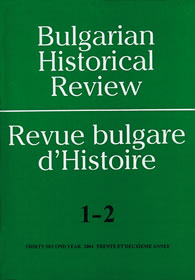САЩ в политическата съдба на България: 1919-1989 г. (Фрагменти от историята на българо-американските отношения)
USA in Bulgaria’s Political Fate: 1919–1989 (Fragments from the History of the Bulgarian-American Relations)
Author(s): Vitka ToshkovaSubject(s): History
Published by: Институт за исторически изследвания - Българска академия на науките
Summary/Abstract: The study outlines the basic stages in the history of the Bulgarian-American relations and the factors that provoked a number of peculiarities in their development. Their first manifestation was the denial of Sofia to accept as a diplomatic agent a person who was at the same time the US general consul in Constantinople. The Bulgarian objections continued from 1901 to June 1903 when the problem was finally settled. During World War One at variance with the existing international norms Washington preserved diplomatic relations with Bulgaria and did not declare war at her although she had joined the opposite war coalition. Being on the side of the vanquished Bulgaria refused to accept the unfavourable separate peace treaty proposed by the US administration. This „self-will“ did not harm the long-lasting significance of the American educational and charity centres for the shaping of the Bulgarian intelligentsia and the acquirement by some Bulgarian institutions of the American experience in the field of health services, agriculture, upbringing of children. The US diplomacy made efforts to attract Bulgaria to the American initiatives for excluding the war as a way for the settlement of conflicts between nations. World War Two once again created a peculiar situation for a specific dialogue between the two states. The impossibility for the Bulgarian government to be forced to stick to the declared neutrality and avoid alliance with the Third Reich placed Bulgaria for the second time among the enemies of the USA (December 12, 1941). With delay America declared „a state of war“ to Bulgaria (June 2–5, 1942), followed by unsuccessful efforts for „the detachment of Bulgaria from the Axis“ through a special operation of the American intelligence service. The Agreement for an Armistice with Bulgaria (October 28, 1944) signed by the USSR, Great Britain and the USA opened minimal possibilities for the influence of the West on the post-war state and political system of the country. The re-establishment of the diplomatic relations (September 1947) offered a short period for difficult communication. The tension (tolerated from Moscow) developed into a conflict in the late 1949 and early 1950 when the American Minister Plenipotentiary D. Heath was declared „persona non grata“ and Washington broke off diplomatic relations in reply. On the part of Bulgaria attempts at ceasing the confrontation started soon after Stalin’s death, which ended successfully in 1959. In the next years the dialogue between Sofia and Washington should be influenced by the Soviet- American relations as well as by the American concepts of „differentiated approach“ and „building of bridges“ towards the Soviet satellites. The effect of their implementation in practice eroded the „unity“ of the Soviet Bloc and created conditions for its collapse.
Journal: Bulgarian Historical Review / Revue Bulgare d'Histoire
- Issue Year: 2006
- Issue No: 1-2
- Page Range: 552-581
- Page Count: 30
- Language: Bulgarian
- Content File-PDF

